
Moving up the slopes, the snow became fierce. Crossing the Ochoco Summit was tricky and you almost wished you had an SUV like the rednecks. But you're on your way down now, and the day is grey and the snow has faded to patches.
You encounter the tail end of a lake that was probably hot stuff 40 years ago, but there are other better places, more lustrous ones now. Your boy has been whining about being hungry ever since Mark's Creek and Emily points out a sign: "Crystal Coral--restaurant 1 mile ahead". You're a man that doesn't like to stop for any reason, but you've got to pee like a big brown dog, so you say, "Okay."
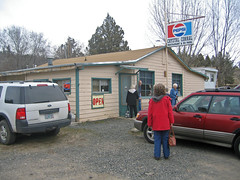
The place doesn't look like much, just a tumble-down place, no gas station, just a sparse RV park and little attached diner. The place seems hopping and the sign out front says "Open".
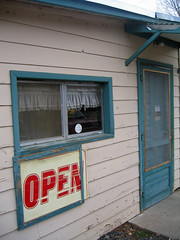 "Lots of cars," Emily says. "A good sign."
"Lots of cars," Emily says. "A good sign."The inside is better than the out, walls of pure hand-milled pine that makes you feel warm. The family sits at a table and you look around expectantly for the john. No luck, so you finally ask. A stout woman with what seems like a perpetual grin tells out to head around out back. You wonder if she's kidding, but she isn't. The john is clean, but chipped and well-used. Old enough that your grandfather might have sat here when he was a young man.
Back inside, you order coffee, decaf, and the lady with the grin says there's not much call for decaf, but she'll brew some for you and you realize you're an unleaded man in a leaded world. You all order, you order a short stack just like your Grampa would. What seems to be a bunch of widow ladies are having a gay old time at the next table. Seems a granddaughter is there, or maybe a great-granddaughter and they sure are sparkling because of that little girl.
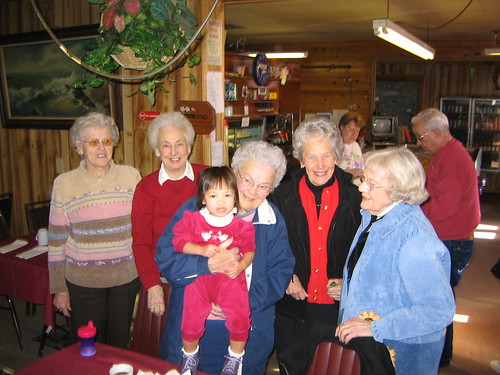
A man in a green uniform shirt and blue jeans wanders and Dexter says, "Look, a park ranger." "Forest ranger," the man says settling into the table next to us. He tells us his name is Dusty and he's headed back up to his station. Dexter and Emily want to go up there, but I say "enough is enough". Dusty tells us the snow is too deep and I like him a little more than I did originally. An old lady shuffles over and brings me my coffee. She seems as if she's in pain, and after she leaves, Dusty tells us she's got a back ticker and her Doc won't let her waitress no more. "Good you made it here," he says. "Place is closing up on March 8th." I ask how so, and he says that some big concern from over in Medford has bought the property and the owners will be moving out soon. "Too bad, this is a place where everyone knows your name" he says, "but the new folks don't want to serve food. They'll bulldoze this place." Susan says what a shame and for her, it is. The food is better than you expect, the pancakes lighter than IHOP. When the old lady comes by with more coffee, you ask for a refill and don't care if it's caffeinated.
The woman with the perpetual grin that seems to be forced now cashes you out and you're surprised that you get change back from your twenty. As you leave, you look back through the window and see the old lady leaning against the counter. On the road again, you son asks, "Can we go back there, again, Dad?" And you wish to God you could say yes.
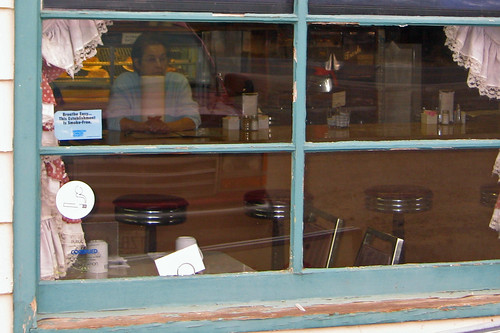
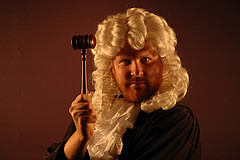 1. Thou shalt not disrespect the judge. Do not tell her she looks like Curly Joe, even if she does.
1. Thou shalt not disrespect the judge. Do not tell her she looks like Curly Joe, even if she does. You'll be fast friends by the time you get out of the clink. If the ticket really cheeses you off, get a lawyer. Get a good one. Not one that your deadbeat brother-in-law Phil recommended. Don't use your family attorney. The best defense attorney is the slimey, pitbulls that the cops hate. Ask around. If you know a cop, ask them. Pay a visit to traffic court, watch some trials, see the attorneys in action. Pick one that you will be comfortable with. Face it, good attorneys aren't cheap, but then bad ones may not be either.
You'll be fast friends by the time you get out of the clink. If the ticket really cheeses you off, get a lawyer. Get a good one. Not one that your deadbeat brother-in-law Phil recommended. Don't use your family attorney. The best defense attorney is the slimey, pitbulls that the cops hate. Ask around. If you know a cop, ask them. Pay a visit to traffic court, watch some trials, see the attorneys in action. Pick one that you will be comfortable with. Face it, good attorneys aren't cheap, but then bad ones may not be either.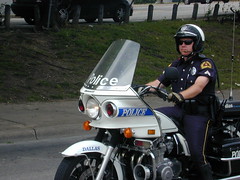 Officer: Okay, pal, where's the fire.
Officer: Okay, pal, where's the fire.




